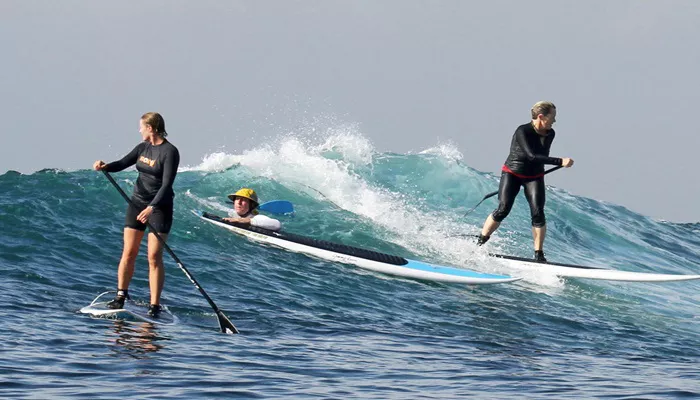Surfing demands more than just balance and board control. It requires powerful, efficient paddling to catch waves and stay in position. For Surfing Beginners and experienced surfers alike, building strength and technique is crucial. Swimming, a full-body workout, closely mirrors paddling motions. In this article, we explore how swimming can directly enhance surf paddling, covering essential techniques, benefits, specific workouts, and tips to accelerate progress.
Why Swimming and Surf Paddling Are Connected
Similar Muscle Engagement
Both swimming and paddling rely heavily on shoulders, back, arms, and core muscles. Proper swimming develops endurance and power essential for surfing.
Cardiovascular Endurance
Swimming improves aerobic capacity. Better cardiovascular fitness helps surfers paddle longer without fatigue, improving wave-catching opportunities.
Breathing Control
Swimming teaches rhythmic breathing. Controlled breathing prevents exhaustion and panic when paddling through challenging surf conditions.
How Swimming Techniques Translate to Surf Paddling
Freestyle Stroke and Paddling
Freestyle, or front crawl, mirrors paddling. High elbow recovery, deep pulls, and steady kicks translate directly to more efficient paddling on a surfboard.
Body Position Awareness
Swimming demands streamlined positioning. Similarly, surfing requires lying balanced on the board to minimize drag and maximize speed.
Arm Recovery and Water Entry
In freestyle swimming, arms exit the water cleanly and re-enter without splashing. Efficient paddling mimics this smooth, minimal-resistance motion.
Benefits of Swimming for Surf Paddling
Increased Shoulder Stability and Strength
Continuous swimming strengthens the rotator cuff muscles, critical for repetitive paddling movements and injury prevention.
Enhanced Core Activation
Strong core muscles stabilize the body during swimming and paddling. A solid core reduces fatigue and improves overall control.
Improved Reaction Time
Swimming builds overall water familiarity. Surfers respond faster to shifting wave conditions, improving positioning and takeoff speed.
Best Swimming Strokes for Surf Paddling Improvement
Freestyle
Primary stroke for surfers. Mimics paddling mechanics. Focus on long, deep pulls and efficient breathing rhythm.
Breaststroke
Good for active recovery. Builds cardiovascular endurance while offering a different muscular challenge compared to freestyle.
Backstroke
Strengthens opposing muscle groups. Enhances shoulder flexibility and core strength, complementing the forward paddling motion.
Essential Swimming Drills for Surfers
Catch-Up Drill
Swim freestyle, allowing one arm to fully complete the stroke before the other starts. Emphasizes stroke length and coordination.
Single-Arm Freestyle
Focuses on one arm at a time. Builds strength and highlights technique weaknesses in each arm individually.
Sculling Drill
Moves hands in small, controlled figure-eight motions. Enhances feel for the water, important for efficient paddling strokes.
Kicking with Board
Using a kickboard, practice steady kicking. Improves core stability and lower body endurance, supporting overall paddling posture.
How Often Should Surfers Swim?
Beginners
2-3 sessions per week recommended. Focus on building endurance, mastering technique, and improving comfort in the water.
Intermediate to Advanced Surfers
Supplement surfing with 1-2 swim sessions weekly. Emphasize high-intensity interval training (HIIT) for sprint paddling simulation.
Building an Effective Swimming Routine for Surfing
Warm-Up
Start with 5-10 minutes of easy freestyle and dynamic stretches. Prepare joints and muscles for intense activity.
Main Set
Include distance swims for endurance. Add sprint intervals for explosive paddling practice. Combine different strokes for balanced strength development.
Cool Down
End with easy laps and stretching. Helps reduce muscle soreness and improve recovery time between sessions.
Dryland Training Complementary to Swimming
Resistance Band Workouts
Focus on external rotation exercises, rows, and tricep extensions to strengthen key paddling muscles.
Core Stability Exercises
Planks, Russian twists, and leg raises enhance core strength crucial for maintaining paddling form under fatigue.
Flexibility Drills
Shoulder mobility routines and full-body stretching improve stroke efficiency and reduce injury risk.
Common Mistakes to Avoid When Using Swimming to Improve Surf Paddling
Overlooking Technique
Prioritize swimming form. Poor swimming habits can reinforce bad paddling mechanics, hindering surf progress.
Neglecting Rest Days
Recovery is vital. Overtraining increases the risk of shoulder injuries and chronic fatigue, impairing surf performance.
Ignoring Specificity
Swimming is beneficial, but direct surf practice remains irreplaceable. Combine both for optimal improvement.
Real-Life Examples: How Top Surfers Use Swimming
Competitive Training
Elite surfers integrate structured swimming workouts into their routines. Focus includes endurance sets, sprint intervals, and open-water swims.
Off-Season Conditioning
When surf conditions are poor, swimming maintains surf-specific fitness. Keeps surfers prepared for the next swell cycle.
Practical Tips for Surfing Beginners
For Surfing Beginners, swimming offers a safe, controlled environment to build water confidence. Combine swim sessions with basic surf paddling drills. Focus on technique over speed. Gradually increase session intensity as strength and endurance improve. Always prioritize proper breathing and recovery to avoid burnout.
Conclusion
Swimming and surf paddling share deep physical and technical similarities. Regular swim training improves endurance, stroke efficiency, breathing control, and strength. For Surfing Beginners and seasoned surfers alike, integrating swimming into training plans accelerates skill development. Master both disciplines to surf longer, catch more waves, and enjoy greater success in the water.

